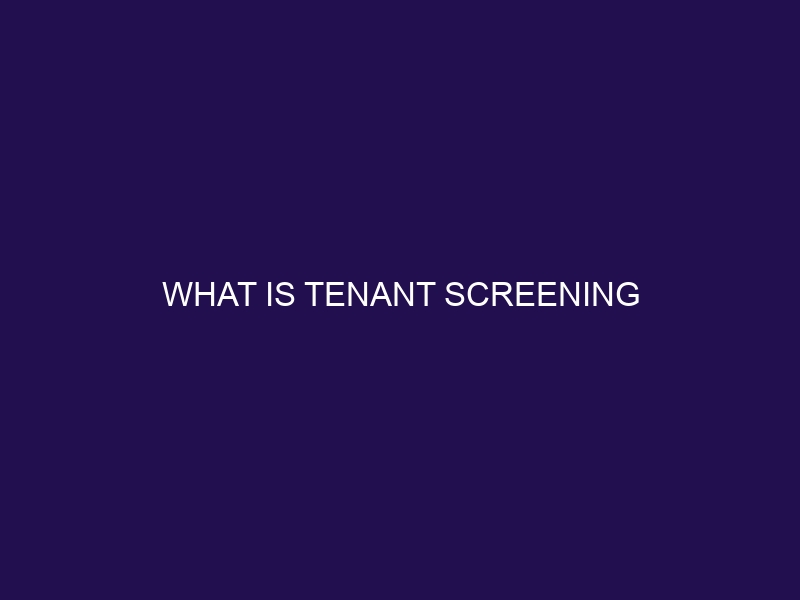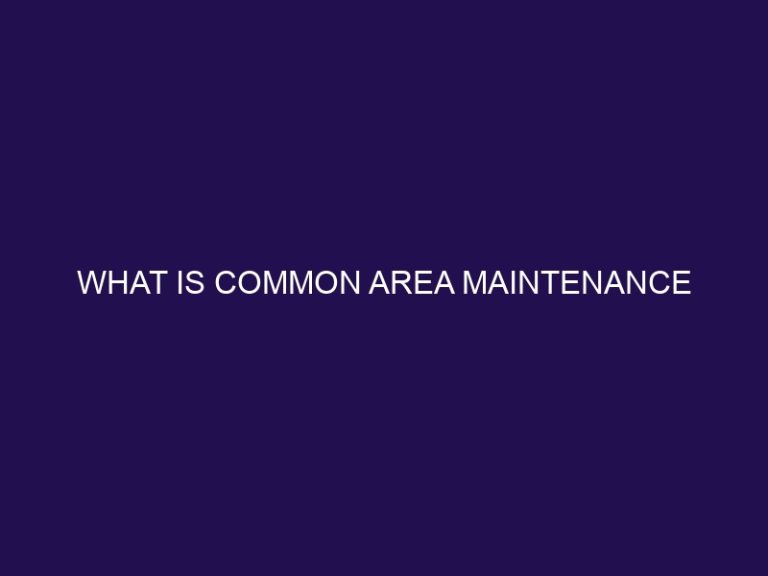What is Tenant Screening
Tenant screening is a crucial process for landlords and property owners to evaluate potential tenants before allowing them to rent a property. It involves assessing various factors to ensure that the selected tenant is reliable, financially responsible, and poses minimal risk to the property and other tenants. Tenant screening is essential for several reasons:
- Protecting Property: By conducting thorough tenant screening, landlords can minimize the risk of property damage and ensure that tenants will take care of the rented premises.
- Ensuring Payment of Rent: Screening tenants helps landlords assess their financial stability and determine the likelihood of receiving consistent and timely rent payments.
- Maintaining a Safe Environment: Tenant screening enables landlords to verify the backgrounds of prospective tenants, reducing the risk of renting to individuals with criminal records or a history of disruptive behavior.
- Reducing Legal Risks: Through tenant screening, landlords can identify potential red flags and avoid renting to individuals who may default on payments or breach the terms of the lease, thus minimizing legal disputes.
During the tenant screening process, several components are typically included:
- Background Check: This involves confirming the tenant’s identity, checking for criminal records or evictions, and verifying their legal status.
- Credit Check: Assessing the tenant’s credit history helps evaluate their financial responsibility and reliability in meeting financial obligations.
- Rental History Verification: Contacting previous landlords allows for insight into the tenant’s rental behavior, such as payment punctuality and adherence to lease agreements.
- Income Verification: Verifying the tenant’s income ensures they have sufficient funds to cover rent and other expenses.
- Employment Verification: Confirming the tenant’s employment details provides further assurance of their financial stability.
Tenant screening is conducted through a multi-step process, which includes an application process, contacting references, and utilizing tenant screening services to gather comprehensive information about potential tenants.
Landlords must also be aware of legal considerations related to tenant screening, such as compliance with fair housing laws and the Consumer Reporting Agencies Act, which regulates the use of consumer reports in the screening process.
To ensure effective tenant screening, it is important for landlords to establish clear rental criteria, maintain consistency in the screening process, and obtain tenant consent for conducting background checks and credit inquiries. Following these best practices helps landlords make informed decisions and select reliable tenants for their properties.
Why is Tenant Screening Important?
Why is tenant screening important? Let’s uncover the key reasons behind it. From protecting your property to ensuring timely rent payment, maintaining a safe environment, and reducing legal risks, tenant screening plays a vital role in safeguarding your interests as a landlord. With the potential risks involved in renting out your property, understanding why tenant screening is crucial can help you make informed decisions and maintain peace of mind throughout the rental process.
Protecting Property
Protecting your property is a crucial aspect of tenant screening. By implementing the following steps, you can ensure the security and well-being of your property:
- Thoroughly screen potential tenants by conducting background and credit checks.
- Verify rental history to see if the applicant has a track record of maintaining and respecting rental properties.
- Verify the applicant’s income and employment status to ensure they have the financial capability to pay rent.
- Utilize tenant screening services to access comprehensive information about the applicant’s background.
In one instance, a landlord implemented strict tenant screening measures and discovered that a prospective tenant had a history of property damage and non-payment of rent. By rejecting the applicant, the landlord protected their property from potential harm and financial losses.
Ensuring Payment of Rent
In order to ensure payment of rent, landlords need reliable tenants who will consistently pay their rent on time. Here are some factors to consider:
- Credit Check: Assess the tenant’s credit history to evaluate their financial responsibility.
- Rental History Verification: Contact previous landlords to gather information on the tenant’s payment history.
- Income Verification: Verify the tenant’s income to ensure they have the financial means to pay rent.
- Employment Verification: Confirm the tenant’s employment status and stability.
- Application Process: Screen tenants carefully to identify any potential red flags regarding payment history.
Maintaining a Safe Environment
Maintaining a safe environment is of utmost importance throughout the tenant screening process. Here are the necessary steps that should be taken to ensure a secure living space for all individuals:
For more information on What is Tenant Screening, please visit the external link.
- Conduct a thorough criminal background check to screen potential tenants and identify any criminal history.
- Verify the applicant’s rental history meticulously, ensuring that they have a spotless record, free from any eviction incidents.
- Contact previous landlords to perform reference checks and gather valuable insights into the applicant’s behavior and track record as a tenant.
- To ascertain financial stability, it is essential to verify the applicant’s employment status and income.
- Enforce strict safety standards by incorporating clear expectations for maintaining a safe environment within the lease agreement.
Reducing Legal Risks
Reducing Legal Risks in Tenant Screening
Reducing legal risks in tenant screening is of utmost importance for landlords and property managers. By doing so, they can ensure compliance with fair housing laws and safeguard themselves against potential lawsuits. Here are some crucial steps that can help minimize legal risks during tenant screening:
- Establish clear rental criteria: Establishing clear rental criteria is essential as it provides a standardized screening process.
- Conduct a thorough background check: A comprehensive background check should be conducted to assess any criminal history that may exist.
- Verify credit history: Evaluating an applicant’s financial responsibility can be done by verifying their credit history.
- Verify rental history: Checking for any previous evictions or lease violations can be done by verifying an applicant’s rental history.
- Verify income and employment: To ensure that the applicant can afford the rent, it is important to verify their income and employment details.
By diligently following these steps, landlords can significantly reduce legal risks and make informed decisions when selecting tenants. It is crucial to note that each state may have specific laws and regulations pertaining to tenant screening.
An excellent real-life example of successfully reducing legal risks in tenant screening took place in California. A landlord in California decided to conduct a comprehensive background check on a potential tenant and unearthed a series of previous rent-related lawsuits. The obtained information played a critical role in helping the landlord avoid a potential legal dispute, ultimately enabling them to choose a more suitable tenant for their property.
What is Included in Tenant Screening?
Looking for a place to rent? Wondering what tenant screening involves? Let’s dive into what is included in tenant screening, covering essential aspects like background checks, credit checks, rental history verification, income verification, and employment verification. Discover how these elements play a crucial role in ensuring a reliable and trustworthy tenant. Buckle up and get ready to unveil the process that helps landlords make informed decisions and maintain the peace of mind they deserve.
Background Check
A background check is an essential part of tenant screening to ensure the safety and security of your property. It helps landlords evaluate potential tenants by obtaining information about their criminal history, eviction records, and creditworthiness. Here are key aspects of a background check during tenant screening:
- Criminal history: Conducting a background check helps landlords identify any past criminal convictions or charges that may pose a risk.
- Eviction records: Looking into the tenant’s background helps assess their rental behavior, including any history of eviction.
- Credit check: Reviewing the tenant’s credit report as part of the background check is essential to evaluate their financial responsibility and ability to pay rent on time.
- Employment verification: Verifying the tenant’s employment status ensures that they have a stable source of income.
Performing a thorough background check can help landlords make informed decisions and choose the best-suited tenants for their property.
Credit Check
A credit check is an essential component of tenant screening, providing insight into an applicant’s financial history and responsibility. Here is a table summarizing the importance of credit checks in the tenant screening process:
| Importance of Credit Check |
|---|
| Evaluates an applicant’s creditworthiness and ability to pay rent on time |
| Assesses an applicant’s financial stability and reliability |
| Indicates whether an applicant has a history of financial delinquency or bankruptcy |
| Helps landlords make informed decisions to protect their property and minimize financial risks |
Credit checks provide valuable information for landlords to make informed decisions when selecting tenants and minimizing potential risks.
Rental History Verification
Rental history verification is a critical step in tenant screening as it helps assess the potential tenant’s past behavior as a renter. To conduct a thorough rental history verification, the following steps should be followed:
-
Contact previous landlords: Obtain the contact information of the applicant’s previous landlords and reach out to them to verify the applicant’s rental history.
-
Verify rental dates: Confirm the accuracy of the dates mentioned in the applicant’s previous rental agreements.
-
Evaluate payment history: Inquire about the applicant’s payment history, including their timeliness in paying rent and whether there were any outstanding balances.
-
Inquire about property care: Ask about the applicant’s cleanliness, maintenance of the property, and whether they caused any damages during their tenancy.
-
Check for lease violations: Communicate with the previous landlords to identify if the applicant violated any terms of the lease agreement, such as noise complaints, unauthorized pets, or excessive damage.
Conducting rental history verification is essential to make informed decisions and ensure that a responsible and reliable tenant occupies your property.
Income Verification
Income verification is a crucial part of the tenant screening process, as it helps ensure that potential tenants possess the necessary financial resources to consistently meet their rental obligations.
- Employment verification: It involves confirming the applicant’s current employment status, job title, and income to establish their ability to pay rent.
- Income documentation: Requesting pay stubs, bank statements, or tax returns is necessary to authenticate the applicant’s stated income.
- Debt-to-income ratio: Calculating the applicant’s debt-to-income ratio is essential to determine if they can comfortably afford the rent, while still meeting their other financial responsibilities.
- Proof of benefits: In cases where the applicant receives government assistance or any other form of benefits, it is important to request documentation to verify both the amount and consistency of these payments.
Employment Verification
Employment verification is a vital component of tenant screening as it ensures landlords that potential tenants have reliable income sources to consistently pay their rent. Throughout the screening process, landlords make contact with the tenant’s employer or HR department to authenticate their employment status, income amount, and duration of employment. This important step significantly minimizes the risk of renting to individuals who might struggle with meeting their financial responsibilities. Utilizing employment verification serves as an effective measure to safeguard the property owner’s interests and maintain a steady rental income.
How is Tenant Screening Conducted?
When it comes to tenant screening, knowing how the process is conducted is crucial. In this section, we will explore the various aspects of tenant screening, including the application process, contacting references, and utilizing tenant screening services. Get ready to uncover the steps involved in finding the ideal tenant and ensuring a smooth renting experience. Let’s dive right in and unravel the secrets of effective tenant screening!
Application Process
The Application Process for tenant screening typically involves several steps to ensure a thorough evaluation of potential tenants. These steps include:
1. Receiving the Application: Landlords or property managers collect applications from interested tenants, usually through an online portal or paper application.
2. Reviewing the Application: The landlord thoroughly reviews the application to ensure that all required information is provided, including personal details, rental history, employment information, and references.
3. Contacting the Applicant: After reviewing the application, the landlord may contact the applicant to clarify any ambiguities or request additional information.
4. Conducting Background and Credit Checks: As part of the Application Process, background checks and credit checks are performed to assess the applicant’s criminal history, financial stability, and creditworthiness.
5. Employment Verification: The landlord contacts the applicant’s employer to verify employment details such as income, job stability, and potential risks.
6. Final Evaluation and Decision: Based on the gathered information from the Application Process, the landlord evaluates the applicant’s suitability and makes an informed decision regarding approval or rejection.
7. Notifying the Applicant: The landlord promptly communicates the outcome of the Application Process to the applicant, providing an explanation if necessary.
These steps ensure a comprehensive Application Process that helps landlords and property managers make informed decisions about potential tenants.
Contacting References
Contacting references is a vital aspect of the tenant screening process. It allows landlords to gather additional information about potential tenants and verify their credibility. Here are several steps to consider when reaching out to references:
- Request reference contacts: Kindly ask applicants to provide references from their previous landlords or employers.
- Establish contact: Reach out to the given references via phone or email to schedule a conversation.
- Prepare questions: Ensure you have a set of well-prepared questions to ask the references, focusing on payment history, cleanliness, and overall behavior as a tenant.
- Listen attentively: Pay close attention to the remarks, tone, and level of enthusiasm exhibited by the references when discussing the applicant.
- Document responses: Take detailed notes during the conversation to refer back to when making a final decision.
By contacting references, landlords can gain valuable insights into the suitability of prospective tenants and ultimately make an informed decision about lease agreements.
Utilizing Tenant Screening Services
Utilizing tenant screening services can greatly benefit landlords and property managers in finding reliable tenants. Here is a list of reasons why utilizing these services is advantageous:
- Efficiency: Tenant screening services streamline the screening process, saving time and effort.
- Comprehensive Checks: Utilizing these services provides detailed background checks, credit reports, rental history verification, and employment verification.
- Legal Compliance: Utilizing tenant screening services ensures compliance with fair housing laws and the Consumer Reporting Agencies Act.
- Reduced Risk: By thoroughly utilizing tenant screening services to screen potential tenants, landlords can minimize the risk of renting to individuals with a history of property damage, evictions, or payment issues.
- Peace of Mind: Utilizing these services allows landlords to make informed decisions and feel confident in their tenant selections.
Legal Considerations in Tenant Screening
When it comes to tenant screening, being aware of the legal considerations is crucial. In this section, we’ll explore two important aspects: fair housing laws and the Consumer Reporting Agencies Act. Discover the essential information you need to know to ensure you’re following legal guidelines and protecting both yourself and potential tenants. From understanding fair housing requirements to navigating the Consumer Reporting Agencies Act, we’ll provide you with insights and tips to conduct tenant screening with confidence.
Fair Housing Laws
Fair Housing Laws are a crucial aspect to consider when conducting tenant screening. These important laws prohibit any form of discrimination based on various factors including race, color, religion, national origin, sex, disability, and familial status. Landlords must ensure that their tenant screening process remains fair and compliant with these laws. It is paramount to treat every applicant equally and apply the same criteria to each potential tenant. Landlords should also stay informed about any additional fair housing laws at the state or local level that might provide extra protections. By adhering to Fair Housing Laws, landlords can steer clear of legal complications and foster an environment that is inclusive and welcoming to all prospective tenants.
Consumer Reporting Agencies Act
The Consumer Reporting Agencies Act (CRAA) is an important component of tenant screening processes. It regulates how consumer reporting agencies handle and report information, ensuring transparency and fairness. Under the CRAA, landlords must notify tenants if adverse actions, such as denial of rental applications, are based on information obtained from consumer reports. Landlords must also provide tenants with a copy of the report and details on the consumer reporting agency used. This act ensures that tenants have the opportunity to review and correct any inaccuracies in their reports, promoting accountability and maintaining fairness in the tenant screening process.
Tenant Screening Best Practices
Discover the key to successful tenant screening with our section on best practices. We’ll uncover the secrets to establishing clear rental criteria, maintaining consistency in the screening process, and obtaining tenant consent. Say goodbye to risky tenants and hello to a hassle-free rental experience. It’s time to maximize your property’s potential and ensure you find the perfect tenants every time. Let’s dive in and explore the tried-and-true strategies for effective tenant screening.
Establish Clear Rental Criteria
Establish Clear Rental Criteria
Consistency in Screening Process
- Consistency in the tenant screening process is crucial for landlords and property managers to ensure fair and reliable results. Here are some key practices to maintain consistency:
- Establish clear rental criteria: Clearly define the requirements and qualifications for potential tenants.
- Use standardized screening procedures to ensure consistency in the process for every applicant, including background checks, credit checks, rental history verification, income verification, and employment verification.
- Train staff members: Provide training to all staff members involved in the screening process to ensure they follow consistent procedures and maintain consistency in screening.
- Document and track all screening decisions: Keep records of all screening results and decisions made, including any supporting documentation, to ensure consistency in the screening process.
- Regularly review and update your screening policies to maintain consistency in the screening process. Stay informed about changes in fair housing laws and adjust your criteria and procedures accordingly.
By implementing these practices, landlords can achieve consistency and fairness in their tenant screening process, reducing the risk of discrimination and potential legal issues.
Obtain Tenant Consent
- To obtain tenant consent for the screening process, it is important to follow these steps:
- Clearly explain the purpose of the screening and the information that will be gathered.
- Provide a written consent form that tenants can review and sign.
- Ensure that the consent form complies with privacy laws and regulations.
- Inform tenants that their consent is voluntary and that they have the right to refuse the screening.
- Store the signed consent forms securely and confidentially.
Remember, obtaining tenant consent is not only a legal requirement but also demonstrates transparency and respect for tenants’ rights. By following these steps, you can ensure a smooth and respectful tenant screening process.
Frequently Asked Questions
What is tenant screening?
Tenant screening is a process used by residential landlords and property managers to evaluate potential tenants. It involves gathering background information and evaluating various factors to determine the likelihood that a tenant will fulfill the terms of the lease and take care of the rental property.
What information is typically included in a tenant screening report?
A tenant screening report can include a variety of information such as credit reports, rental history, employment verification, criminal history, sex offender registries, and national terrorist watchlists. The report may also provide a risk score or recommendation based on the landlord’s chosen criteria.
Can I dispute information in a tenant screening report?
Yes, as a tenant, you have the right to dispute any information in the tenant screening report that you believe is inaccurate or outdated. You can also request a free copy of the report within 60 days of being denied housing.
What are the responsibilities of landlords when using tenant screening reports?
Landlords have responsibilities as users of tenant screening reports. They must provide notice of adverse action if the information in the report is used to deny housing. They are also required to disclose the contact information of the company that made the report and provide tenants with the opportunity to dispute any inaccurate information.
Are there any laws that protect tenants during the tenant screening process?
Yes, federal law requires landlords to inform applicants if a tenant screening report or credit report was used to deny them housing. Additionally, landlords must provide contact information for the company that made the report and give tenants the right to dispute any information in the report. Tenants also have the right to receive a free copy of the report within 60 days of being denied housing.
What should I do if I encounter bad business practices by a tenant screening company or landlord?
If you experience bad business practices by a tenant screening company or landlord, you can report them to the Federal Trade Commission (FTC) or consult housing advocacy groups for guidance. It is important to know your rights as a tenant and take appropriate action to address any issues.







